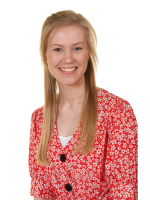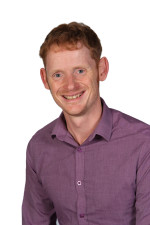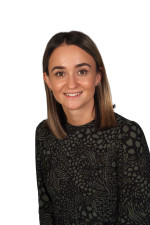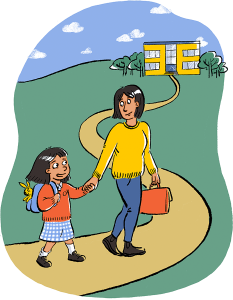The early years foundation stage (EYFS) sets standards for the learning, development and care of children from birth to 5 years old. All schools and Ofsted-registered early years providers must follow the EYFS, including preschools, nurseries and school reception classes. You can read more about the EYFS Framework here: EYFS Statutory Framework (DfE, 2023)
Early Years Foundation Stage (EYFS)
In EYFS, we are busy bees and learn through our school values to be inquisitive, to be kind and to be resilient.
EYFS follows a different framework to the rest of the school, and our children learn in different ways that reflect their age, needs and interests. Vocabulary connected to EYFS can be confusing, so we hope this page helps to demystify EYFS as well as describe what makes EYFS at our school unique.
To find out more click on each headline.
Our Early Years Foundation Stage policy is linked here.
What is EYFS?
What does EYFS consist of at Leeming & Londonderry Community Primary School?
Our EYFS children are part of class 1 which includes reception, year 1 and year 2.
Who works in EYFS?
We are lucky to be part of a dedicated, experienced, and enthusiastic EYFS team, who work together to ensure the best possible outcomes for all our children. Our passionate team believe that every child deserves the best possible start in life and work hard to support each child to fulfil their potential. We meet regularly to invest in our professional development and share ideas about how we can improve our provision and practice – to us, Early Years is more than just a job, it’s a lifestyle!
 |
 |
 |
|
Miss N Hawes |
Mr D Harper |
Miss E Burnside |
|
EYFS / KS1 Teacher |
HLTA |
EYFS Lead |
Miss E Burnside is our Synergy Schools Federation EYFS Lead teacher, who supports our EYFS team to ensure our children receive the best start to their education.
What are the principles of EYFS
In Early Years Foundation Stage, there are four overarching principles:
Unique Child + Positive Relationships + Enabling Environments = Learning and Development
How do children learn in EYFS
At Leeming and Londonderry Community Primary School, we recognise that all children develop at different rates and learn in different ways. The three characteristics of effective learning are:
-
Playing and exploring: Children investigate and experience things and ‘have a go’
-
Active Learning: Children concentrate and keep on trying if they encounter difficulties and enjoy their achievements
-
Creating and thinking critically: Children have and develop their own ideas, make links between ideas and develop strategies for doing things
In FS, our day is structured with daily teaching inputs in SSP (phonics) and Maths. In September, whilst the children are settling into their new routines these inputs are short and snappy and we spend longer in free-flow. As the year progresses, our inputs become longer and more frequent to enable the children to be school-ready and prepared for the challenges of Year 1. Beyond the classroom, we also enjoy our visits to the woods where we engage in outdoor learning and on Tuesdays and Fridays we do PE – everyone’s favourite part of the week!
What do children learn in EYFS?
There are seven areas of learning and development that shape learning in EYFS. All areas of learning and development are important and inter-connected.
The Prime areas
- Communication and language
- Physical development
- Personal, social and emotional development
To ensure our children make good progress in these prime areas, each child is assigned three next steps by their Key worker for them to work towards. Progress is discussed in our weekly team meetings and staff share ideas on how we can enable children to meet their goals by supporting them with questioning (based on Bloom’s taxonomy), modelling language and with resources within the provision.
The Specific areas
- Literacy
- Mathematics
- Understanding the world
- Expressive arts and design
How do the 7 Areas of Learning relate to the National Curriculum (Y1 - Y6)?
This table shows how the 7 Areas of Learning relate to the National Curriculum. Please note that this is a 'best fit' model as all 7 Areas are inter-related and the Prime Areas inform everything that children learn in EYFS.
| Communication & Language | PSED | Physical Development | Literacy | Mathematics | Understanding the World | Expressive Art & Design |
|---|---|---|---|---|---|---|
| All Subjects | PHSE | PE | English | Mathematics | Science | Art |
| History | Music | |||||
| Computing | Drama | |||||
| Geography | Design Technology | |||||
| Design Technology | ||||||
You can read more about what children will be learning in each of these areas and how they can be supported here: Development Matters
How are children assessed in EYFS?
Assessment is a continuous process in EYFS and takes place both informally and formally. Effective assessment helps us to take an accurate snapshot of the whole child, celebrate their successes and put into place any additional support which they may require. Our parental partnerships are an important part of the assessment process, and we love hearing from our EYFS families about children’s experiences at home through conversations and our online learning journal, Tapestry.
- Informal Assessment: Blooms questioning, observing, supporting and stretching play during free-flow, Team meeting discussions
- Formal Assessment: Reception Baseline Assessment, half termly phonics assessments (FS only), Tapestry observations, Early Learning Goals
Towards the end of children’s time in FS, children are assessed against the 17 Early Learning Goals and are evaluated as meeting expected levels of development (expected) or not yet reaching expected levels of development (emerging). You can read more about the Early Learning Goals below:

What makes EYFS at Leeming & Londonderry unique?
As an EYFS team, we asked ourselves; ‘What do we want our children to know?’ and ‘What do we want our children to be?’. We use our whole school vision ‘To be the best that you can be’ and our school values to be inquisitive, to be kind and to be resilient, to develop this learning.
What do you intend your children to be?
In EYFS, it is our intention that our children are:
Inquisitive
- We recognise that each child is unique and help them to develop their own interests and to clearly communicate their thoughts and feelings.
- Being a small school enables all staff to know all the children and adapt learning to suit their needs and interests.
- Our mixed age classes nurture an environment in which younger children look up to their older role models and aspire to share their wider vocabulary and experiences and therefore they are more inquisitive.
- Our children feel safe and secure, enabling them to have the confidence to question, experiment, and take risks.
- Our children are excellent communicators and are comfortable using a rich range of vocabulary and language structures to express themselves and explain their ideas.
Kind
- As well as developing a strong sense of self, children also learn about their place within our school, community and the wider world. They are kind, inclusive and respectful of all.
- The family ethos of our school encourages children to be kind and considerate to others of all ages.
- By learning about the natural world, our children also learn to value, respect and care for our planet.
- Our children are kind, thoughtful and supportive of each other. They learn to work alongside and with children of a range of ages. They know how to share and can work together as a team to solve problems.
- We are a community of learners and are supported through our strong relationships with our children’s families, our Early Years team, Governors and our Church and village community.
Resilient
- Our children enjoy coming to school and are instilled with a love of learning that will sustain them not only during their time in education but throughout their lives.
- When children leave Foundation Stage, they are equipped with the skills they need to read, write and explore number.
- We foster an environment where children develop a ‘have a go’ attitude and build their resilience so that they embrace challenge as they progress throughout their lives.
- They have the confidence to try new things and persevere in the face of challenge.
- Levels of engagement and self-esteem are high as children feel valued, important, and listened to. Their happiness and wellbeing is at the heart of everything we do and this supports the children to have a go.
How do we implement this vision?
Inquisitive
- Our EYFS learning environments are calm and supportive, children can relax and feel free to be themselves and safe to explore.
- The small numbers in our class allow for us to build special bonds with all the adults we work with and this allows the adults to promote every child’s individual wellbeing and allows children to be confident to be inquisitive.
- By following the children’s interests, we celebrate their individuality and what makes them unique.
- We provide a broad and balanced curriculum which is underpinned by our EYFS vision and school values. We have a strong focus on delivering the ‘Prime areas’ of the EYFS curriculum, which children are supported with through their individual ‘next steps’
- In EYFS, children have daily, structured inputs in phonics and Maths and read with an adult at least three times per week.
- The Insight assessment tracker is used to measure children’s progress towards meeting the Early Learning Goals
- Metacognition strategies are modelled by staff ‘thinking out loud’ and modelling how to be inquisitive.
- Our environment, inside and out, is created to be organised, stimulating and irresistible to learning opportunities taking place, encouraging inquisitive, enquiring minds.
- Our mixed age class allows children to be inspired by and learn from their older peers.
- Our staff are invested in their own professional development, the children know that we love learning too!
- Books are at the heart of our curriculum and children look forward to story time, a special part of the day.
- Opportunities to promote good communication skills are built into the day during inputs and when modelling to children during free-flow
- Sentence stems are provided during teaching inputs to encourage children to use full sentences when explaining their ideas
- Our mixed age class allows for children to see how older children talk, discuss and explain, allowing real life models to inspire them.
Kind
- We are patient listeners and allow children time to express and explain themselves. We model kind listening and praise when our friends are kind listeners too.
- We model respectful behaviour and polite language during all our interactions, with children and adults alike
- Turn-taking and listening are skills; thus, they are explicitly taught during PSED inputs and within free-flow
- Respect starts with knowledge. We teach our children about different cultures and faiths so they can better understand them
- Kind and considerate acts are acknowledged and rewarded
- Many of our key texts have been selected because they explore the theme of respect: for ourselves, each other, for communities and the planet
- Our classrooms are inclusive and cater for every child’s learning needs.
- We discuss regularly how to be kind to each other.
- All children can contribute ideas during class planning time enabling them to take ownership of their learning
- Our children have lots of opportunities to work with the other children in the class through everyone having chance to access our provision areas.
- The Early Years team plans together to ensure that children have the best possible experience whilst in our care, we model good teamwork to our children
- Our curriculum threads ensure children play an active part in our school and community, as well as understanding their place in the larger world
- Through our curriculum, as well as through our PSHE Jigsaw scheme, we actively plan how to help children to play and work together e.g. through team building
- Clear safeguarding guidelines ensure children are kept safe within our settings.
- The small nature of our class allows for all adults to have a deep understanding of all the children and are aware of any changes in their behaviour, however small
- We have high expectations of behaviour which is managed through rewards (bee point system, golden time) and sanctions (traffic light system)
- Children are taught how to keep their bodies and minds safe through exercise, healthy eating, mindfulness activities through our curriculum and through our PSHE Jigsaw scheme.
Resilient
- Skills such as perseverance and ‘having a go’ are encouraged through our provision and rewarded through our school vision bee points and collective worship celebration assemblies.
- We model resilience and discuss how we can be resilience.
- We use our 3 before me motto to guide us if we are stuck with our work.
- Our continuous provision offers inspiring and regular challenge which promotes the skill of resilience and through adult intervention children learn to keep going to achieve a task.
- Mistakes are a part of learning, we use the language of ‘Growth Mindset’ (Dweck, 2006) to explain this.
What is the impact of your EYFS vision?
Inquisitive
- Our classrooms are filled with joy! All children enjoy coming to our setting, they arrive each day smiling, are ready to learn and want to find out more.
- Our children are inspired by the themes which have been initiated by our children’s interests. This results in high levels of involvement, creative thinking and a love of learning.
- Our mixed age class allows for the children to learn from each other and make progress across the EYFS curriculum. They are inspired to be inquisitive from the older children in the class.
- Security results in children being confident learners, with a willingness to inquire, persevere and problem solve.
Kind
- Children are kind to themselves and their peers, their behaviour and manners are impeccable
- Global Citizens: children have the knowledge, skills and values to engage with the wider world
- In the words of Greta Thunberg ‘No one is too small to make our difference’, our children are empowered and understand that small actions can make a big impact
- Children develop strong friendships, they play and learn together by listening and taking turns. They understand how to resolve conflicts calmly and independently. They happily work alongside children of various ages.
- EYFS are excellent representatives of our school and their contributions are valued by the local community.
Resilience
- Our children work hard to achieve their goals and the impact of our EYFS curriculum can be seen through children achieving the 17 early learning goals.
- Our children make rapid progress in reading, writing and number skills.
- Our children leave FS with the resilience to face the challenges in Year 1 and beyond.
- Children are confident when talking to different people, demonstrating their rich vocabularies and conversation skills
- Children feel safe and secure. This is demonstrated by the improvement in children’s well-being and involvement as the year goes on, as measured by the Leuven Scale
What do you want your children to know?
We have designed our own broad and balanced curriculum which is underpinned by our EYFS values. In addition to following children’s interests, we have five themes which are threaded throughout the year.
These themes have been carefully selected to reflect what we feel is important for our children to know, such as how to look after their mental-health and wellbeing (All About Me) which has never been more important than during the ongoing Covid 19 pandemic. The theme of Our School reflects our understanding that although it is a privilege to be with children at the beginning of their education, we are just a small part of their lifelong learning journey. Our Community gives us the opportunity to appreciate what a wonderful part of the world we live in (God’s Own Country!) whilst Our World acknowledges the limitations of our location in terms of children having rich, multicultural experiences which therefore need to be planned. Finally, climate change threatens our children’s most basic rights. We hope that what our children learn through Our Planet will inspire a love and respect for nature that will motivate them to make choices that help to lower their carbon footprints and protect the planet for future generations.
All About Me
- Create a sense of our unique self
- Develop our own interests through new experiences
- Learn how to make healthy choices for our bodies and minds
Our School
- Take an active part in wider school life
- Form bonds with older children through their roles as Science and Reading Ambassadors
- Work towards being school-ready by the end of our time in FS
Our Community
- Strengthen links with our village and Church
- Walk around our village regularly to observe changes
- Sponsor a local farm
- Explore what makes North Yorkshire special
Our World
- Discover different countries; their customs, culture and languages
- Celebrate religious festivals and cultural events eg. Diwali, Hannukah and Eid-Al-Fitr
- Understand how we can be good Global Citizens
Our Planet
- Explore seasonal changes
- Develop a love of nature
- Grow our own food
- Learn to care for and respect our environment
A Year in Foundation Stage
You will find details below of the year ahead in Foundation stage or follow the link to download our supporting information.
EYFS Curriculum Long Term Plan
EYFS Progression Documents
Follow the links below to our progression information
EYFS Knowledge progression - Communication and Language
EYFS Knowledge progression - Expressive Arts and Design
EYFS Knowledge progression - Literacy
EYFS Knowledge progression - Mathematics
EYFS Knowledge progression - Personal, Social and Emotional Development











